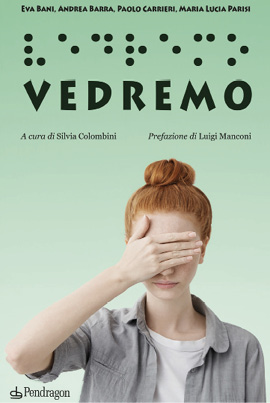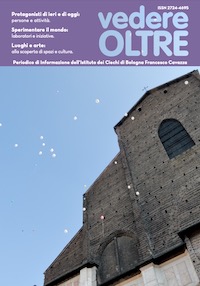Like all good stories, this one began by following a curiosity, a desire, a yearning for adventure: to organize a writing workshop during one of the training courses scheduled by the Francesco Cavazza Institute for the Blind. The goal, in addition to stimulating participants with a creative activity, was to help them structure their experience in the form of a story. The dream was to be able to publish a book. The classes lasted for months, spent together in text analysis, exercises and actual study of collective book design. The fateful moment of individual writing arrived, a demanding period that requires time, dedication and willingness to put oneself out there. Four young people accepted the challenge: Andrea Barra, Eva Bani, Maria Lucia Parisi and Paolo Carrieri. Despite course commitments and upcoming exams, they threw themselves enthusiastically into creating their story. This is how was born Vedremo (We’ll See), a project combining their four stories. They all take place over the course of a day during which each of them has chosen to share a lived experience, a moment in life, their own worldview. Indeed, the four authors, all living with vision loss, experience the world with a rare sensitivity and depth. Without rhetoric, far from clichés, with energy and passion, Andrea, Eva, Maria Lucia and Paolo wrote pages filled with emotion, conveying an intense and original vision of reality. Once the writing of the book was finished, Maria Lucia also managed to involve a personality like Luigi Manconi in the project.

Sociologo, politico (tra le altre cariche, è stato Presidente della Commissione per la tutela dei diritti umani del Senato della Repubblica), editorialista di «La Repubblica» e «La Stampa», fondatore e Presidente di A Buon Diritto onlus, ipovedente, Manconi ha accettato Sociologist, politician (among other roles, he was President of the Commission for the Protection of Human Rights of the Senate of the Republic), columnist for La Repubblica and La Stampa, founder and President of A Buon Diritto onlus, visually impaired, Manconi agreed to write a preface, thus adding the value of his testimony to that of the others. The project was then presented to Edizioni Pendragon, an independent publishing house founded in Bologna nearly 30 years ago, with a rich and varied nonfiction and fiction catalogue. Like all good stories, this one, which began in late 2021 and continued into 2022, has a happy ending. Antonio Bagnoli, the editor of Pendragon, agreed to publish We’ll See. With the support of his brother Goffredo, the editing work began, the revision of the text aimed at looking for errors and typos, and the actual preparation of the volume: cover, proofreading, final layout. Today, We’ll See is a book that everyone can read out of curiosity and pleasure, but also to reflect on how there are so many different ways of perceiving a reality that at times we believe corresponds only to what we feel. Page after page, the stories of Andrea, Eva, Maria Lucia and Paolo allow the reader to enter an unfamiliar universe where perhaps to find between the lines even forgotten parts of us. After all, that is what stories and books tell us. Marcel Proust, who knew a thing or two about books, said that “the writer’s work is merely a kind of optical instrument that makes it possible for the reader to discern what, without this book, he would perhaps never have seen in himself.” Written by those who see little or nothing at all, the book We Will See in truth broadens the horizons of the heart and mind, what really matters. The book is available in print and digital versions on all online portals, on the Edizioni Pendragon website and is available in all bookstores.





.png)